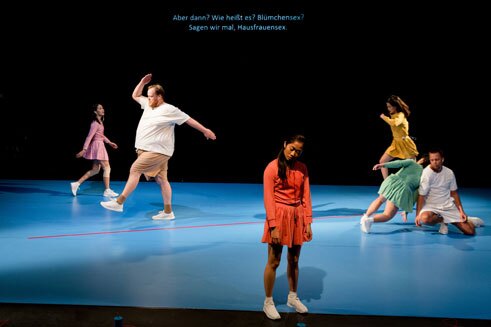International co-production
Experiencing borders and limits

In Seoul, Korean theatre makers joined forces with members of the German Theatre Berlin to produce the play: “Walls – Iphigenia in Exile”.In Bangkok, the Democrazy Theatre Studio and the Badischer Staatstheater Karlsruhe together staged the performative project “Happy Hunting Ground”. Apart from their merit as international theatrical co-productions, both projects kindled an interest in further collaborative work .
One of the most fascinating phenomena of international co-productions is the spark which ignites when 2 very different artistic philosophies and organisational forms converge. The participation of theatre-makers from German-speaking countries can imply great aesthetical and structural differences of approach for the collaborating theatres. This is partly explained by the fact that Germany has the most extensive theatre system worldwide, with programmes changing on a daily basis and with actors, dancers and singers in permanent engagement. In South America, Asia and Africa the theatre scene tends to be made up of freelance groups, which form and re-form according to the project. They rarely have a room where they can rehearse and perform.
Intercultural exchange on equal terms
One of the first consequences of this is the lengthy preparation time. When international co-productions strive to achieve intercultural exchange on equal terms, it takes the theatre makers much longer than if they were working within structures familiar to them. It is not merely a case of developing ideas, narrative structures and approaches to staging a performance. It is also about the very different communication cultures and theatrical traditions of two cultural groups which are very far removed from each other. It can be just as strange as communicating in a foreign language. This must have been how the Korean and German theatre artists felt when they got together in Seoul. Their aim was to produce “Walls - Iphigenia in Exile“ – combining the Goethe classic “Iphigenie auf Tauris“ with modern-day experiences of frontiers, alienation, migration and exile.Trailer “Walls – Iphigenia in Exile“ from the German Theatre Berlin(source: YouTube)
What did the two sides have in common that they could build on? Whereas Germany was a divided country for decades and the border experience remains a topic of discussion, in South Korea the border with its brother nation in the north and the steadily growing number of north Korean asylum seekers still form part of a bitter reality. According to Sonja Anders, the theme of the play is a demanding one which had not been formulated beforehand. “Our first meeting was free of purpose. We wanted to get to know each other first without creating the pressure of having to produce. The theme resulted from our dialogue.”
Cultural Comprehension
When asked to describe what she considered to be the most important experience of the project, the head dramatist of the Deutsches Theater said that this type of collaborative work really made you question your own forms of communication and your production rituals.”You need to keep your eyes and ears open to be able to understand how a foreign culture works” The German-Thai co-production „“Happy Hunting Ground“
| Photo: Badisches Staatstheater Karlsruhe/Felix Grünschloß
Sarah Israel’s experience was similar. As dramatist and director of the Rodeo Munich Dance and Theatre Festival, she worked closely with Thai dancer and choreographer Thanapol Virulhakul during the development of the Thai-German performance of “Happy Hunting Ground”. In the co-production’s programme booklet she wrote, “ Collaboration of this kind demands an understanding of the other culture, the country and the way of life of the people, all of which are conveyed through their bodies, their behaviour and their thinking”. Patience is necessary “to be able to understand what lies behind the silence of people you are talking to.”
The German-Thai co-production „“Happy Hunting Ground“
| Photo: Badisches Staatstheater Karlsruhe/Felix Grünschloß
Sarah Israel’s experience was similar. As dramatist and director of the Rodeo Munich Dance and Theatre Festival, she worked closely with Thai dancer and choreographer Thanapol Virulhakul during the development of the Thai-German performance of “Happy Hunting Ground”. In the co-production’s programme booklet she wrote, “ Collaboration of this kind demands an understanding of the other culture, the country and the way of life of the people, all of which are conveyed through their bodies, their behaviour and their thinking”. Patience is necessary “to be able to understand what lies behind the silence of people you are talking to.”
Creative Energy
For the production of “Walls - Iphigenia in Exile“, the actors, dramatists and producers studied text fragments of Goethe’s classic work, developing texts and dramatic situations which, depending on the sequence, were enacted by different combinations of actors.The result is a classical, text-based theatrical production whose formal fragmentation corresponds to what was once a reality in Germany and still is in Korea: life in a divided country.
The performative project “Happy Hunting Ground”, in which the author of this text was also involved, was divided into two different phases: research and production. Based on interviews with Thai women, men from German-speaking countries and Thai-German couples, the project attempts to come to terms with what lies behind the sex and love market concentrated in Thailand. The director dealt freely with the text material and developed a choreography combining dance and body-language. Although these transnational projects differ greatly one from the other, in one aspect both co-productions achieved the same result: they produced and released a creative energy which, at best, was absorbed into the artistic process.
Trailer des Badischen Staatstheaters Karlsruhe zu „Happy Hunting Ground“ (Quelle: YouTube)